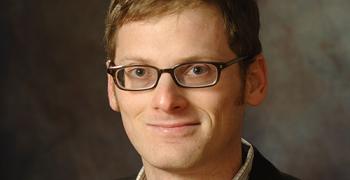Home > Press > U. Of I. Physicist Named Packard Fellow In Science And Engineering
 |
| Physics professor Benjamin Lev is the 11th Illinois professor to be awarded a Packard Fellowship since the program began in 1988. |
Abstract:
University of Illinois physics professor Benjamin Lev has been named a Packard Fellow in science and engineering. He is among 17 early career researchers honored by the David and Lucille Packard Foundation in 2010 for outstanding creative research.
U. Of I. Physicist Named Packard Fellow In Science And Engineering
Champaign, IL | Posted on October 16th, 2010Lev was recognized for his proposal to study exotic phases of matter, such as supersolid, superglass and superstripe phases. Since its inception in 1988, the Packard Fellowship Program has named 457 fellows, including 11 U. of I. faculty members. Each year, new fellows are chosen from nominations submitted by the presidents of 50 top universities.
"We are extremely pleased that the Packard Foundation has provided this national recognition of Benjamin's superb technical achievements and extraordinary promise," said Dale J. Van Harlingen, the head of the physics department at Illinois. "He has become a very active player in our physics research portfolio in Urbana."
As an expert in atomic, molecular and optical (AMO) physics, Lev explores quantum properties of correlated matter by manipulating dipole interactions in exotic atoms. His group demonstrated the first magneto-optical cooling and trapping of the highly magnetic element dysprosium.
Lev currently is pursuing three main areas of research: quantum liquid crystal physics, soft quantum matter and atom chip microscopy.
"His merger of experiment and theory from both AMO and condensed matter physics should contribute to important breakthroughs in our understanding of strongly correlated quantum matter, the development of new architectures for quantum computation, and the development of new ultrasensitive probes for magnetic- and electric-field imaging," Van Harlingen said.
The Packard Fellowship Program supplies an unrestricted five-year, $875,000 award to support research of the recipient's choosing. Lev will apply his award to develop a new experimental technique to generate, detect, and manipulate complex quantum matter - supersolids and superglasses - using emergent atom-light crystals.
Lev earned his doctorate from the California Institute of Technology in 2005, then worked as a National Research Council postdoctorate fellow at the University of Colorado at Boulder before joining the Illinois faculty in 2008.
The Packard Foundation is not the first to recognize Lev as one of the most promising young researchers in the U.S., as he also has been honored with a Faculty Early Career Development (CAREER) Award from the National Science Foundation and a Young Investigator Program Award from the Air Force Office of Scientific Research.
####
For more information, please click here
Contacts:
Benjamin Lev
217-333-8079
Copyright © University of Illinois
If you have a comment, please Contact us.Issuers of news releases, not 7th Wave, Inc. or Nanotechnology Now, are solely responsible for the accuracy of the content.
| Related News Press |
News and information
![]() Researchers develop molecular qubits that communicate at telecom frequencies October 3rd, 2025
Researchers develop molecular qubits that communicate at telecom frequencies October 3rd, 2025
![]() Next-generation quantum communication October 3rd, 2025
Next-generation quantum communication October 3rd, 2025
![]() "Nanoreactor" cage uses visible light for catalytic and ultra-selective cross-cycloadditions October 3rd, 2025
"Nanoreactor" cage uses visible light for catalytic and ultra-selective cross-cycloadditions October 3rd, 2025
Physics
![]() Quantum computers simulate fundamental physics: shedding light on the building blocks of nature June 6th, 2025
Quantum computers simulate fundamental physics: shedding light on the building blocks of nature June 6th, 2025
![]() A 1960s idea inspires NBI researchers to study hitherto inaccessible quantum states June 6th, 2025
A 1960s idea inspires NBI researchers to study hitherto inaccessible quantum states June 6th, 2025
![]() Magnetism in new exotic material opens the way for robust quantum computers June 4th, 2025
Magnetism in new exotic material opens the way for robust quantum computers June 4th, 2025
Academic/Education
![]() Rice University launches Rice Synthetic Biology Institute to improve lives January 12th, 2024
Rice University launches Rice Synthetic Biology Institute to improve lives January 12th, 2024
![]() Multi-institution, $4.6 million NSF grant to fund nanotechnology training September 9th, 2022
Multi-institution, $4.6 million NSF grant to fund nanotechnology training September 9th, 2022
Grants/Sponsored Research/Awards/Scholarships/Gifts/Contests/Honors/Records
![]() Researchers tackle the memory bottleneck stalling quantum computing October 3rd, 2025
Researchers tackle the memory bottleneck stalling quantum computing October 3rd, 2025
![]() New discovery aims to improve the design of microelectronic devices September 13th, 2024
New discovery aims to improve the design of microelectronic devices September 13th, 2024
![]() Physicists unlock the secret of elusive quantum negative entanglement entropy using simple classical hardware August 16th, 2024
Physicists unlock the secret of elusive quantum negative entanglement entropy using simple classical hardware August 16th, 2024
|
|
||
|
|
||
| The latest news from around the world, FREE | ||
|
|
||
|
|
||
| Premium Products | ||
|
|
||
|
Only the news you want to read!
Learn More |
||
|
|
||
|
Full-service, expert consulting
Learn More |
||
|
|
||








